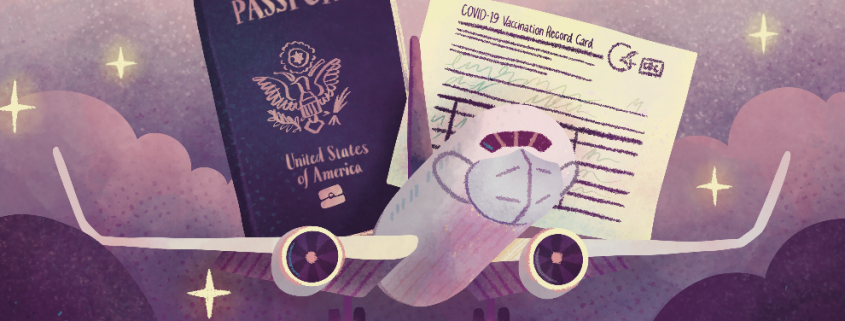Vaccination mandate is necessary for domestic travel

The airtight, close quarters and cramped nature of airplanes have intensified the risk of flying the unfriendly skies during the pandemic. With the surge of the Omicron variant, waiting in packed security lines, boarding planes and walking within crowded airports have also taken on a compounded risk factor.
While commercial jets are equipped with “HEPA filters capable of removing tiny airborne particles” and passengers are required to wear masks on their domestic flights, the Centers for Disease Control and Prevention hasn’t implemented any other safety precautions on airlines to help preempt the spread of the coronavirus. This must change. Given Omicron’s incredibly high transmission rate, it is paramount that the government institutes a universal vaccination mandate prior to flying domestically.
On Nov. 8, 2021, Los Angeles launched SafePassLA, stipulating that indoor establishments such as restaurants, salons, movie theaters and gyms require proof of full vaccination for patrons to enter. It’s therefore reasonable that airports should follow suit.
As of Dec. 6, 2021, the White House requires all international travelers to show proof of vaccination and a negative coronavirus test taken no more than one day before travel to the United States. Chief Medical Advisor Dr. Anthony Fauci further asserted that vaccine requirements for commercial flights are “something that seriously should be considered.”
However, in an interview with ABC News, President Joe Biden stated he has yet to institute such a requirement because he’s been advised that it’s “not necessary.” When you employ cost-benefit analysis to this situation, it’s clear that such a vaccination requirement presents more benefits than it does drawbacks.
Dissenters typically highlight three drawbacks regarding mandatory vaccinations on air travel. First, it would adversely affect airlines economically; it would also make the boarding process too time-consuming, and it would be burdensome to implement. First and foremost, all of these objections pale in comparison to the overarching benefit of protecting public health. While some may believe that a vaccination mandate would dissuade people from traveling and thereby create an economic deficit for the airlines, this simply doesn’t add up as people still regularly visit their gyms or hair salons despite the vaccine mandate.
This also begs the question of how domestic students will be affected when they fly in for school after the holidays. According to Dr. Susan Hopkins, the chief medical adviser at the U.K. Health Security Agency, the “omicron variant can infect 3 to 5 people at a time.” The unfortunate reality then is that students have an increased risk of getting the coronavirus and then risk subsequently transmitting the virus to fellow students.
As for the arguments centered around time and burdensomeness, the post-9/11 airport security and safety precautions undermine such beliefs. Before 9/11, there was virtually no security within airports. Seemingly overnight, however, the aftermath of 9/11 saw the development of a thorough screening process that includes security lines, 3D imaging scanners, X-ray machines for carry-ons and more. While requirements of vaccinations may prolong security and prove cumbersome to implement, it certainly isn’t unfeasible.
The irony of this debate is striking. Take an international student who has to take a connecting flight domestically to get back on campus. The student is required to show proof of vaccination prior to flying internationally but is not required to do so on his domestic flight to California. So while it’s difficult to get into the country, it’s not a big deal for someone to fly into L. A. Yet, for the said individual to even step foot onto campus, they are required to show proof of full vaccination, test negative for the coronavirus before arriving, schedule a screening test within three to five days of arrival to campus and are expected to refrain from interacting with large groups.
Given the clear disconnect, it’s unsurprising that the U.S. leads in the highest number of coronavirus cases and coronavirus-related deaths with over 60,600,000 cases and 858,000 deaths and counting. While the coronavirus is rampant globally, there’s a stark contrast between the pandemic numbers in the U.S. as opposed to overseas. For example, India last recorded 35,516,186 coronavirus cases and 483,463 deaths on Saturday.
Ostensibly, people aren’t permitted to enter the U.S. without proof of vaccination as a means of protecting the country. Meanwhile, people who are unvaccinated and potentially positive for the coronavirus are flying within the country. This logic simply doesn’t exist.

